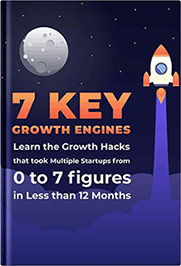
Pre-employment tests are standardized or rather objective ways of gathering data on candidates during the recruitment or hiring process. All of these tests have not only been well-validated but also professionally designed and developed and they have a common factor: they are a reliable and efficient means of gaining insights into the traits/characteristics and capabilities of potential employees.
With respect to the type of test being used, pre employment assessment tests can provide relevant information on a job applicant’s ability to perform in a job organization.
The popularity of pre employment testing has grown over time. This has been because there have been quite a large number of applicant pools on jobs advertised. The internet has actually made it easier than ever before for job hunters to apply for jobs in as much time as they want. In fact, a certain research done estimates that a whopping 250 resumes on average are submitted for every corporate job vacancy.
Additionally, through the same internet, a number of CV/resume spammers usually distribute their CVs and resumes across the internet in blasts, without even checking the needed qualifications. Resorts from recruiters have proved that fact and they have confirmed that 50% of those applications do not meet the requirements needed for the advertised jobs.
For that reason, most employers/recruiters don’t have the bandwidth to go through the applications of every applicant no wonder they have deceived to embrace pre employment tests which provide tremendous value for organizations seeking to hire the right talent.
The tests have done more good for employers/recruiters so far, saving time, money, reducing turnover by hiring high potential job candidates.
Due to the same, there has been an increase in the number of companies that provide pre-employment tests as well. In this guide, we will discuss the types of tests that are administered during hiring, the benefits they have for the employer and the job candidate as well and also mention some of the few companies that provide the tests.
General Benefits of Pre Employment Tests
i) Reduce Employee Turnover Rate – According to research done by Center for American Progress, it will cost you 16% of the annual salary of entry-level employees if you have to replace them. The cost even rises more with the higher the position. For middle-level employees, it will cost you 20% of their annual salary and for the high-level executive employees, it could cost you 200% to replace them.
To prevent this costs of replacement, therefore, you need to hire trained quality employees and the way through this is to administer an aptitude or a job knowledge test to help you determine and predict the performance of your employers.
ii) Better Appraisal of Skills – When a job applicant understands from the very start of a pre-employment test that his/her knowledge in the field of application will be screened, chances are that he or she will hardly try to attempt to talk their way into the position. In most cases, they believe that the screening test will walk the talk into the position of the application.
It, therefore, means that during the interview, there are chances that as an employer you are going to hear little but what is required at that time and let the knowledge test speak for your applicants. But lest you forget, saving time during the interview is not the focus of administering a knowledge test.
Instead, the test should give you as the employer a glimpse of the ability of the applicant to handle pressure and adversity while at the same time showing you what he/she knows in the field of application, something that you can hardly discover only through an interview.
iii) Team Placement – Aside from knowing better appraisal of skills, job knowledge test will help you determine the specific team your applicant will best fit into. This is very important especially when one of your departments of the organization has a deficiency in some skills.
Types of Pre Employment Assessment Tests
There are a number of pre employment tests that are administered during the recruitment processes. The most common assessment tests are:
i) Job Knowledge or Aptitude tests
ii) Integrity assessment tests
iii) Cognitive assessment tests
iv) Personality tests
v) Emotional Intelligence tests
vi) Skill assessment tests
vii) Physical assessment tests
1. Job Knowledge or Aptitude Testing

Industries that require specific skills to job functions have found this test very important. Job knowledge which can also be referred to as an aptitude test, measure the theoretical expertise or the technical knowledge in a certain field.
For example, to hire an accountant, it would be very necessary to ask about the basic accounting principles. Among other technical fields that require kinds of expertise, like law enforcement and information technologies among others, this test focuses on proving that employees have been trained in the field and that they can apply their knowledge in given scenarios.
A knowledge test will clearly show an applicant who has a better grasp of a certain skill you lack in the department. Actually, you might not get enough understanding of your applicant’s aptitude and skill in the field through the interview only and that is why the job knowledge test is very crucial.
Example of Job Knowledge Test Sample for NTSE
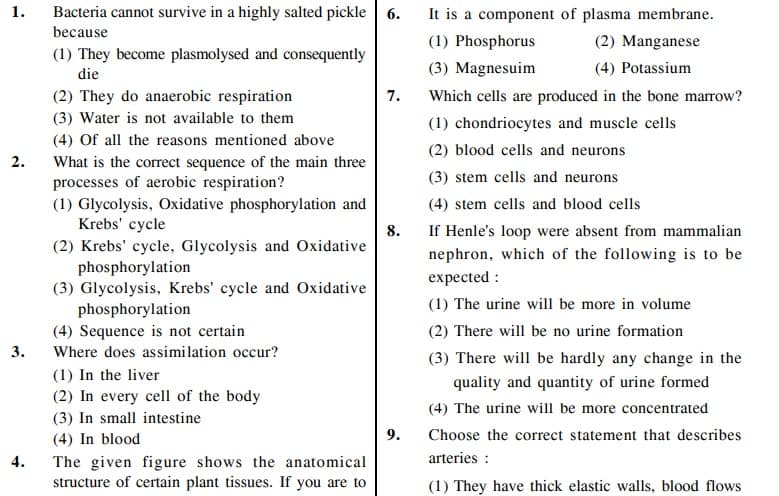
DISCLAIMER
However, as important as this test is, it does not guarantee that if employees pass it, they are the right professionals for the job. This is because job knowledge does not take into account the most desirable of attribute when it comes to employees: learning ability.
Most times, a candidate might know more a lot but they could turn out to be so rigid that they are unable to adjust to new ideas, knowledge, and innovation. And also, a bold point to note: There is a big gap between what someone knows in theory and what they are capable of doing practically and that is why there are more pre-employment tests you can administer that we have also discussed below.
Some Popular Companies that utilize the Aptitude Pre employment Test
i) Johnson and Johnson – Johnson and Johnson as one of the largest pharmaceuticals in the world usually attracts so many applications for every job they advertise. Once you are shortlisted, you will do the aptitude test online.
ii) Apple – Workers across the globe and graduates always dream to work for Apple. However, before you finally get on board, you with other shortlisted candidates will be invited for an aptitude test which is done in a physical interview.
iii) Microsoft – Microsoft takes quite a traditional approach when it comes to an aptitude test. Once candidates are done being assessed online, Microsoft then administers the aptitude test to screen out candidates.
iv) Samsung – Samsung has customized their own pre employment aptitude test for their assessment process to use it to screen out candidates who are usually a number of them.
v) Deloitte – One of the most popular companies, Deloitte has a five-step recruitment process that helps them manage the many applications they receive. In the five-step assessment, aptitude tests are used to disqualify huge portion of candidates.
2. Integrity Tests
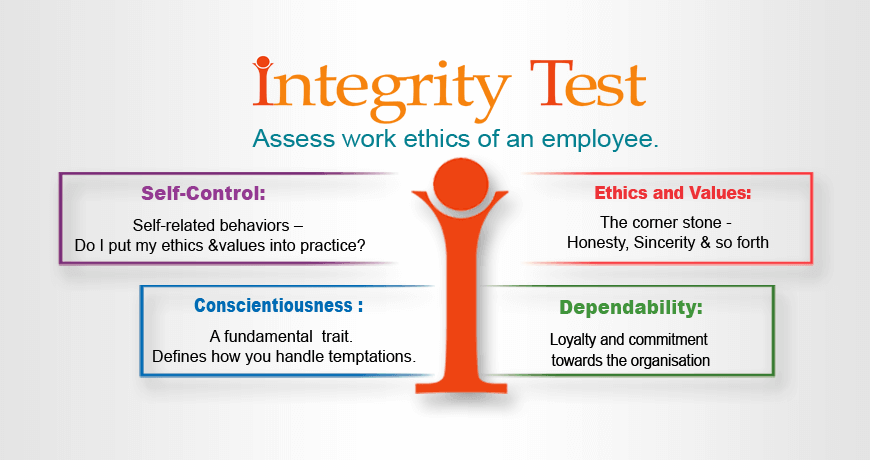
Integrity, as the name integrity suggests, is meant to test a candidate’s general work ethics, dependability, and even honesty. This test has been used for over 60 years and most employers have used it to avoid employing ‘high risk’ candidates. In fact, this test has grown popular in the United States after lie detector tests were banned by the EPPA(Employee Polygraph Protection Act)
Integrity tests are of two forms: Covert and Overt. Covert integrity testing is based on personality. This test assesses integrity by proxy for example conscientiousness. Overt on the other hand tests counterproductive behaviors and dishonest for example theft, absenteeism, and cyberloafing.
Advantages of Integrity Testing
A well-set integrity test will give you a candidate who is more likely than not be an honest employee. Honest employees are an asset to the whole organization. If they are going to be absent, then they are for a viable reason. This, therefore, means that the more honest employees you have, the more productivity for your organization.
Disclaimer
As much as testing an employee’s integrity is important, it is vital to understand that faking has become a common problem for almost all of the testing. For instance, it is easy for candidates to fake and tell employees all they want to hear during the overt integrity testing.
To put it in context, some of the most commonly asked phrases/statements are: “I have ever stolen from my workmates before and would still do it if I could get away with it, or I would lie to my boss if that would get me out of trouble”.
Once a candidate is told to rate these kinds of statements, they would instantly understand what kind of responses are acceptable. This entirely means that even the high scoring candidates in these tests could be accomplished liars or even ethical paragons.
Example of Integrity Test Sample
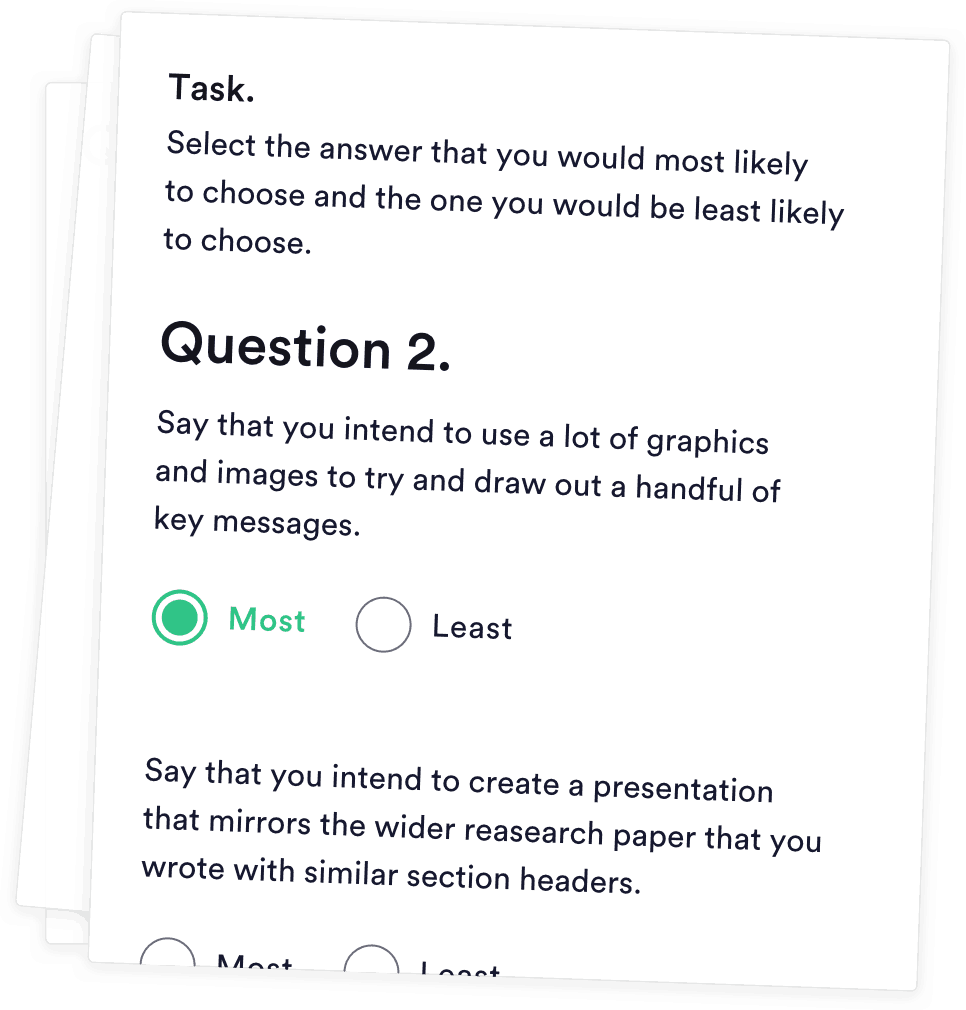
Companies that Provide Integrity Tests
There are a number of companies that provide integrity tests. The most popular one, however, is HireSuccess. The HireSuccess have a demo that you can try out and see if it best suits your company. HireSuccess has a number of elements that they test in regards to integrity including: employee theft, High turnover, Absenteeism, Employee Substance use, Low Productivity, customer complaints, disruptive behavior and conflict with managers & supervisors. Therefore, as an employer, you will have to choose the elements that you will need to test from the candidates.
3. Cognitive Ability Tests
Cognitive ability pre-employment tests are excellent tests that measure the abilities of your employees in terms of comprehending concepts, planning & organization, abstract thinking, learning quickly from experience, applying new knowledge and adapting to unknown situations among others.
Due to all the abilities named above, most psychologists have touted the cognitive test as the best predictor of the future performance of a prospective employee at your organization. A candidate who indicates a high cognitive ability is capable of learning new skills quite quickly, adapt to new and above all make intelligent decisions.
These are exactly the essential skills that help an employer adapt to a new job. In fact, candidates who score higher on this test require lesson training as compared to the lower scoring counterparts and they also tend to be more productive.
Most common types of questions usually asked in cognitive tests
i) Numerical reasoning questions – This is basically a number-based kind of assessment questions that ranges from simple arithmetic/mathematical tests to critical high reasoning numerical assessments. For samples and more on numerical reasoning tests click
ii) Verbal reasoning – This kind of cognitive test questions aims at evaluating an employee’s range of English skills such as comprehension, grammar, vocabulary and critical reasoning. The test also has classical questions that require you to read a passage and thereafter identify whether selected statements from and about the passage are false, true or cannot say.
iii) Deductive reasoning – For these tests, you must apply certain rules given by an argument or a statement to come up with specific conclusions.
iv) Logical reasoning – Logical reasoning test questions are basically questions that ensure an employees ability to read, conceptualize and most importantly understand complicated texts with the aim of utilizing critical thinking skills to recognize important facts and draw conclusions.
v) Abstract reasoning – The abstract reasoning test questions will test your ability to work with concepts and abstract ideas. Most questions in these tests include visual diagrams that you have to use to complete a given sequence or identify missing information.
vi) Spatial Awareness – The spatial test questions, tests your ability to work with shapes and patterns. At most times, you will be required to mentally rearrange shapes to make new shapes or visualize image and patterns when they are flipped or rotated.
vi) Mechanical reasoning – The mechanical reasoning test questions will test your ability to use the simple principles of mechanics like working with cogs, springs, and levers.
Most of the cognitive tests can be done through a computer and are usually multiple-choice questions with different levels of difficulty and at the end of it all, the results from these questions will draw an accurate profile of an employee’s capabilities.
Additionally, these tests usually have a time limit to handle, and that means you will require to complete all the questions. At times though, an employee is asked to complete as many questions as they can in the set time.
Types of Cognitive Ability Tests
Most employers source their ability tests from different providers depending on what they need in their employees. Highlighted below are some of the popular test providers and companies that use them.
This test will assess a candidates’ attitude using a mixture of face recognition, puzzle recognition, verbal reasoning questions, and word problems. They are of two versions:
i) A 12 minutes limit Wonderlic Personnel Test with 50 multiple choice questions
ii) An 8 minute Wonderlic Personnel test with 30 multiple-choice questions.
Some of the popular companies known to use the Wonderlic tests during pre employment are:
i) ThoughtWorks
iii) Apple
iv) Chevrolet
v) Gulf Coast Commercial Group
This kind of assessment tests skills like numerical reasoning, verbal reasoning and pattern recognition. It is a 12-minute test that comprises 50 questions. Some of the companies that use these tests include:
i) Chevron
ii) Microsoft
iii) Dell
iv) IKEA
c) SHL Tests
It is one of the companies that are the leading providers of employment aptitude tests. They are a number of them and each of SHL tests is designed to assess respective competency. Usually conducted in two stages, the SHL is the perfect stage you can administer to your candidates. At first, the candidate is given the test online and then on the assessment day, they will be asked to do another shorter version of the test to verify their previous answers done online.
SHL tests include:
i) Verbal Reasoning Test – A 19/18/11 minutes tests with 30 questions done on the assessment day.
ii) Inductive Reasoning test – 25 minutes test with 24 questions that are ideally designed to test and evaluate your logic skills.
iii) Numerical Reasoning Test – They are two: 10 questions to be answered in 15 minutes and 18 questions to be answered in 25 minutes.
iv) Deductive Reasoning Test – In this test, you are given 18 minutes to answer 20 questions.
They require you to use logic to evaluate arguments, identify errors in the information, and make conclusions.
Companies that use these tests are:
i) Microsoft
ii) Ford Motor
iii) Gannett company
iv) Phillip Morris
These are the most popular psychometric tests that are taken by graduate. In fact, over 200,000 people worldwide have taken this test. The identified areas of tests by Revelian test are: Cognitive ability, numerical reasoning, abstract reasoning, and verbal reasoning.
Companies that use this test include:
i) PEpsico
ii) Median Hotels
iii) BMW
iv) Deloitte
Disclaimer
As much as the test is supposed to best predict an employee’s ability to solve problems and think critically, and employee as well can practice to improve their scores on the assessment day. Aside from that, cognitive tests are vulnarable to ethnic and racial differences and thus posing a discrimination risk.
Example of Cognitive Test Sample
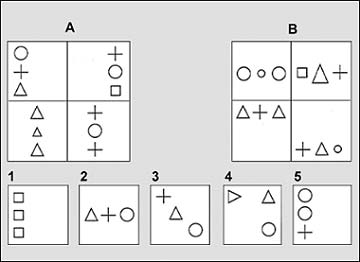
Features of the Criteria Cognitive Aptitude Test(CCAT)
At the very first glance, the Criteria Cognitive Aptitude Test (CCAT) always look to be intimidating. However, as a job candidate do not panic. In fact, you do not need to get all the questions right to impress your employers. Just remember that most CCAT takers do not make it all the way through. Numbers show that average candidates usually get 24 questions right.
CCAT Quick Facts
i) The test has 50 questions
ii) You have to answer as many questions as you can in time limit of 15 minutes.
iii) It involves 3 questions:logic, mathematical, verbal and spatial reasoning.
iv) Calculators are not allowed in the test
v) Candidates who are able to answer all the 50 questions are less than 1%vi) Once you have completed the test, your employers will receive your raw score, the questions you got right and how you performed compared to everyone else that took the test.
General CCAT Tips
i) Read the instructions – One of the most common mistakes CCAT takers do is rush through the instructions. However, the trick to pass the CCAT test is through careful reading of instructions. All you need to remember is that use the instructions to create a strategy that can help you score as high as you can. Read the instructions keenly and understand them. Additionally, there is usually no penalty for any wrong answers given, therefore as you take the test, just guess and move on if you will be having trouble answering a particular question.
ii) Play to your strength – Not in many cases will you find people who have the same strength in math and verbal abilities. Some will favor ABCs and 123’s not both. This is to mean that you should ensure that you give yourself a chance to answer all the questions that you are comfortable with. For instance, If word problems usually throw you for a loop and your mathematics skills are rusty, it is fine to risk a guess and move to other questions that you are more likely to get right.
iii) Time management – Putting in mind that you have 15 minutes to answer 50 questions, it technically means that you have to work on every question at least 20 seconds. As we had advised above, there is no need to hurry to finish up all the questions to impress your employer or manager. All you need to do is manage time well and ensure you answer the questions that you are conversant with you satisfyingly. Do not spend too much time on one question as it` will affect you. Once you find out that you have spent close to or more than a minute on a certain question, it is advisable to make a guess and move to the next.
4) Personality Tests
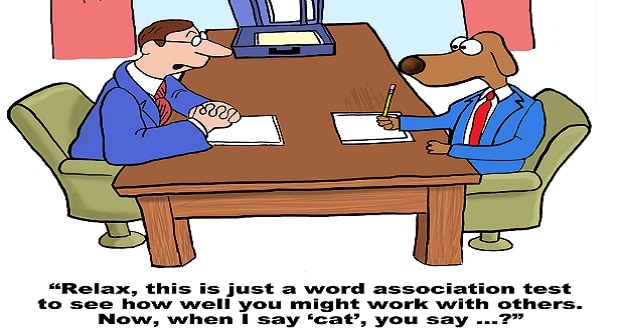
The personality test for jobs is basically used to determine an employee’s typical attitude and reactions to different situations. Additionally, to try and identify how well an employee feels about the kind of people they would like to work with, their normal reaction to stressful situations and how well they get along with others, the personality test is administered during the pre employment process.
Aside from an employee’s knowledge and experience from their aptitude in areas like teamwork and decision making, we will all agree that their personality and the attitude is also very important to the growth of an organization and that is why personality tests are very necessary.
Purpose of Personality Tests
In over 20 years or so ago, there has been a huge change in the way general businesses operate. In most cases, the business culture tends to focus more on the customer, and employees have much more input and freedom than they used to before.
This, in turn, has meant that businesses and organizations require employees who are willing to communicate with many customers and different colleagues daily and change their style of working if need be. All these can be determined by your personality, which explains why personality tests have become more popular during the pre employment process.
Therefore, a personality test helps in evaluating an employee’s ability to handle an array of tasks like leading others, working in a team, coping with stress, managing stakeholders and most importantly solving problems.
For instance, a candidate in a sales role or customer service may be required to have a very different personality type from a candidate who should be recruited into a technical role or data analysis.
Disclaimer
As much as personality test are very important during the pre employment process, making a wrong decision can be very costly to an organization. Making wrong decisions would include:
i) Screening out great candidates
The whole point of personality testing is to try and identify whether a candidate’s personality fits with a given job or not. Although it works perfectly with most professions, the tests are not going to work in all cases.
In fact, the test may portray a candidate with normal personality as the best during the assessment session and an employer could end up eliminating a candidate with a more eccentric creative type of personality who might have great potential.
Examples of Personality Test – Sample

Companies that provide Personality Test
There are a number of companies that provide personality tests solutions. They include:
i) Athenaq – Is one of the best pre employment test solutions for your personality test. With a simple platform and dashboard, you will be sure to have the best results.
ii) Harver – Harver provides a number of tests but their personality tests have been touted as one of the best.
iii) Xobin– Xobin is an Integrated Recruitment Software for Small & Agile Tech teams looking to do quick & fast hiring.
5. Emotional Intelligence Tests
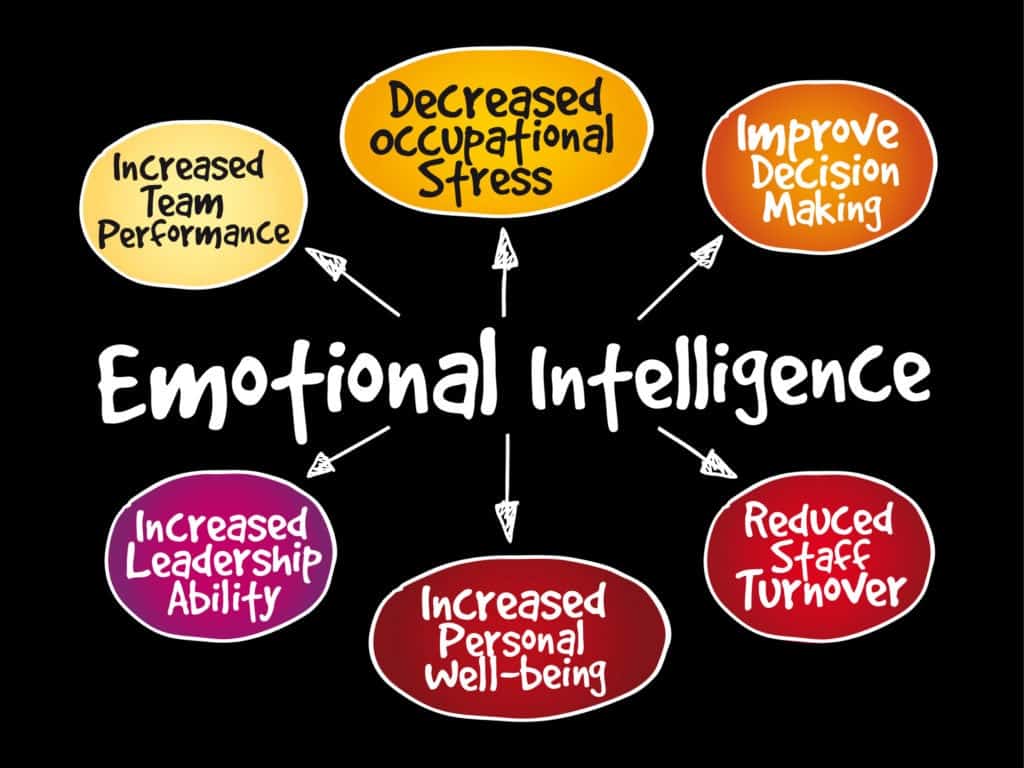
Emotional Intelligence(EI) sometimes abbreviated as EQ is the ability of someone to recognize and manage their own emotions and emotions of people who surround them.
The Emotional Intelligence test which is done during pre employment, therefore, helps employers to identify potential employees who are aware of their emotions are able to control them and above all have better relationship management skills.
These tests will as well guide employers on which potential employees have better leadership skills. Most people who are emotionally intelligent portray these kinds of characteristics. They usually are:
i) Self-aware
ii) Have the ability to perceive the emotions of people in their surroundings
iii) They react accordingly( not quick to reaction).
v) More likely to help others
v) Have a social empathy
vi) Adaptable
v) Curious
vi) They manage their own impulses solve problems, manage change well and communicate with others effectively.
Just like Cognitive skills, emotional intelligence can be measured by tests during pre employment. To assess the level of EI(EQ) in a candidate, you will have to use a combination of tests and most importantly your gut instincts.
Specific behavioral and observational questions during the assessment can give a sort of insight into a potential employee’s Emotional intelligence.
Most questions used in these cases are the questions that seek to know how they take criticism and whether or not they admit mistakes when they arise and learn from them. You can also observe for example if the person listens more than they talk to they talk more than they listen.
Salovey, Bar-On Emotional Quotient testing models, Mayer and Caruso Emotional Intelligence tests(MSCEIT) are the most commonly used intelligence tests. The tests named will show or portray an emotional situation to the takers and then have the employer choose their reaction to situations described.
The benefit of this test is that once you get employees with a high level of emotional intelligence, it is for the good of your company/organization. A candidate with a high level of self-awareness, conveys the ability to control compulsions without having to jump into impulsive conclusions tend to have a positive impact in any organization.
It is also safe to say that emotional assessment intelligence helps an organization or an employer know how well a potential employee can fit and perform in terms of social responsibility, global versatility, credibility, teamwork, organization building, development, and leadership.
Disclaimer
Determining emotional intelligence in your potential employees is very important. However, just like all other tests, a candidate may do a self-reporting bias which means they can rate themselves higher than they are in actuality.
Examples of Emotional Intelligence Interview Questions
i) How would you resolve a dispute between two colleagues at the workplace?
ii) Tell us about the time when you had an ethical dilemma at your job place. How did you deal with it and what was the result?
iii) Tell us about the criticism you have ever faced at work. How did you respond and what lessons did you learn?
iv) Tell us about the time when you had a conflict with your work supervisor. How did it go? Did you resolve it? How did you resolve it?
v) Suppose a client calls to complain that the prices we have set for our service or product is too low? How would you respond/handle it?
Examples of Emotional Intelligence Instances
These are basically actions that have been done so far in the real world to show how emotional intelligence of a certain employee or team worked for the better of the company/organization.
i) Gap’s CEO took a suggestion of a 5 year old compliant without dismissing and made major changes in just two weeks, something the had a direct impact on the company.
ii) Satya Nadella, Micorosoft’s CEO sent quite an amazing email to their employees after a what seemed like an epic fail.
iii) Sherryl Sandberg, Facebook’s COO was influenced by a personal tragedy that made her make changes in the company policy for her colleagues.
6. Skills Assessment Tests
Skills assessment are tests designed to help employers evaluate the level of skills from their potential candidates for their job and even employees. Using these skills in the pre employment helps companies ensure that their potential employees have the skills required to successfully perform in their jobs.
Skills tests have been more often used because many organizations or employers use it to narrow down or filter their list of candidates who usually avail themselves on the day of the interview.
There are a number of methods that an employer can use when assessing a candidate’s skills. Some of them are:
i) Resume reviews
ii) Interviews
iii) Reference checks
iv) simulation exercise
v) Skill tests
However, skill assessment tests of high quality are usually formal, scientific and standardized. This is because the tests are usually meant to produce a clear rating, score, description, and a category.
At the end of the skill assessment test, an employer should be able to yield a clear rating, score, description and a category for their job candidates. For that reason, the tests can define, measure and evaluate job candidates abilities and skills during the pre employment assessment.
As compared to other assessment skills, there are other additional benefits to these tests. For instance, during these tests like interviews and resumes or even reference checks, you will get an opportunity to hear about the candidates themselves and what they say about their skills.
Disclaimer
However much these tests are important, it is good to note that your job candidates may practice and will try to present themselves in their best way ever probably more than their skills are in normal cases.
In fact, studies show that 85% of employers have caught job candidates on their resume. However, you can have structured job interviews with well-experienced interviews which can be a solid predictor of job performance by trying to read the body language of the job candidates.
Additionally, you can also try job simulations which have been very effective when predicting job performance even though as compared to administering skills assessment tests, interviews and job simulations are very time consuming and very expensive.
How common has Skill Assessment Testing been Used?
Despite the fact that skill assessment tests have been around or quite a few years, there has been an enormous growth of the employers who use it in the last few years.
As we speak, more than 80% of companies use pre employment skill tests from a Candidate Experience Research by Talent Board.
The reason for the rise in the number of employers who use the pre employment skills test has had a boost because of the technological and scientific advancement especially in assessment tools that help big time.
In fact, the tools are not more affordable than ever to the convenience of employers.
Additionally, because they guarantee a great candidate experience, it speaks volumes as to why the skill assessment tests have become more popular. Besides, these tests can be accessed and done online from the employee’s/job candidate’s home and the time factor is not an issue these days.
Choosing the right Skill Assessment Test
As we discussed above, there are many different types of skills assessment tests which can measure a job candidate’s technical and soft skills. Therefore, when choosing the right test for your candidates, you should consider the specific position/vacancy you are looking forward to filling and also the right skills needed to perform the role well.
For instance, if you are looking forward to hiring a job candidate with teamwork, strong communication, problem-solving, public presentation, time management, leadership skills, technical writing, project management or coding & programming, you will first define the most relevant skills for all the positions.
Choosing the right Skill Assessment tool
There are so many providers existing in the market that as an employer it can be a problem when choosing the best one. For you to make the right decision in finding the right tool, follow the steps below:
1. Define your needs and goals
This is the initial stage that you will need to do. During this time, ask yourself questions like
i) Is the test for existing employees or job candidates? In this case, it is pre-employment.
ii) Are your goals to identify skill gaps in the current employers hire the best job candidates.
iii) How many people are you planning to evaluate on a yearly, quarterly or monthly basis?
2. Define the skills you want to evaluate
All you need to do during this stage is to define skills you would want to evaluate in your job candidate. The best question to ask yourself should be are you going to evaluate technical or soft skills or both of them.
Sometimes, the assessment tools are specialized in either technical or soft assessments but we also have tools that offer both the technical and soft skills.
During this stage, therefore, you should create a list of all the skills you want to evaluate your potential employees. After that, you will now find a tool that offers the assessment that you fully need for the process.
3. Define the characteristics of your perfect tool
Defining the characteristic of the tool you will need for your assessment is vital. You will ask yourself questions like:
i) Should it be a scientifically validated skill assessment tool?
ii) Can the tool be integrated with applicant tracking system?
iii) Does your assessment tool offer all the time(24 hours) customer support by telephone or email?
iv) Should the tool offer the possibility of skill test customization?
v) Should the tool provide an amazing candidate experience?
During this stage as well, you may fancy considering the budget constraints you have before finally buying a skill assessment tool.
4. Research the market
Once you have defined the perfect tool for your skill assessment, you can now research the market. You can browse the top skill test providers websites and compare them side to side.
By creating a list of desired characteristics of the skill assessment tool you need you will be able to compare different tools faster and even easier.
5. Decide between the top 3
From your list, pick the top 3 skill assessment tools for a test drive. Most of the tools offer demos and free trials, therefore you might fancy taking advantage of that and at the same time, you will not need to worry about spending on the test drive.
Once you do that, you will be able to put the tools into comparison and evaluation from the first-hand experience.
Example of Skill Test – Sample for Sales Skill Assessment
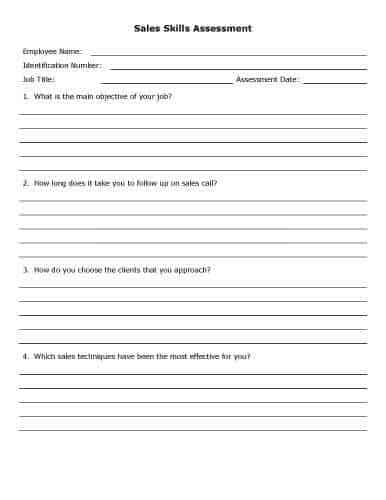
Skill Assessment Tool Recommendations
From the list we will provide below, you should be able to find the best tools that will work for the company during pre employment process. All the tools names below can offer an assessment which can be done easily and quickly through software which should be well designed.
The list is written randomly and there is no order of merit. As an employer, you only get to choose the ones ideal for your job candidates.
i) Hirevue – A combination of artificial intelligence, video and game-based changes that provide the best skill test solution during pre employment.
ii) Prevue – Prevue’s aptitude test is one of the best in the game. With a simple and easy to use dashboard and software, the test is ideally designed to test skills during your pre employment assessment .
iii) Vervoe – Vervoe was designed with an integrated AI to help you assess thousands of applications. If you are in for skill testing during your recruitment process, the Vervoe is the solution to go for.
iv) Deskiller -Devskiller has a library of framework and programming languages that will help you verify the exact coding and programming skills you will be looking for.
v) eSkill – With 5000 combinable topics and 600 standard tests, your skills testing during pre employment is safe with eSkill.
The list above among many other pre-employment assessment test solutions will serve you well as a recruiter/employer.
Types of Testing that can Best (and worst) Predict Job Performance
All recruitment professionals will always agree that hiring predictions are difficult to get right. In fact, the majority of today’s companies and organizations are struggling big time. According to a research done, 95% of companies have agreed to make bad hires.
Even after looking at all the types of pre employment tests above there is a need to identify specifically the kind of testing that will bet predict job performance.
Before we take a look at the best predictor tests for job performance, here are (worst) strategies that most of them use to predict job performance and at the end of it, you will agree that the predictors are not good enough to predict job performance.
Worst Hiring Predictors
i) First Impressions – From a survey done back in 2000, 1 in 3 employers or interviewers made a hiring decision within as short as a 1 and a half minutes of meeting a job candidate. It was like a first impression kind of strategy. However, first impression does not necessarily mean that you are right. In fact, first impressions are based on superficial qualities like the 4 As Affability, Attractiveness, assertiveness, and Articulateness. None of these attributes can predict job performance but they can give an interviewer an impression causing them to ignore the red flag and rate the job candidates abilities and aptitudes higher than they should.
ii) School Grades – Most of the people who went to college worked hard for their grades to try and boost them as much as they would. However, it is unfortunate that school performance is not a good predictor, contrary to what many people think.
For instance, data was collected from more than 5000 independent studies and it showed that a candidate’s GPA trials were far behind the other factors that predict job performance. Few of the candidates that were chosen based on GPA were good job performers as it only increases the chances of hiring a strong performer by 4 % compared to random selections. Therefore if you are going to hire, hire not for the title but for the skills.
iii) Interview – Interviews, whether done online or physically 1 or 1 will never be good predictors of job performance. Actually, it is very easy for an interviewee to fake everything during the process. Additionally, you may end up losing the best job candidates during interviews because of bad impressions. In fact, during an interview, questions asked might not be enough to gauge whether a certain job candidate is qualified for the job or not.
iv)Tricky questions – Sometimes for both interviewer and interviewee tricky questions during that time makes the whole interview so informal and impersonal. Asking unnecessary ‘tricky’ questions like “What would you do in case there was an alien attack or “Instead of the elevator and stairs, which one would you prefer to use”? May not really help you predict if the job candidate is qualified for the job. They may be funny, but they are time wasters. Therefore, during pre employment assessment you are supposed to use questions that will draw a picture of the profile for your job candidate.
Best Hiring Predictors of Job Performance
i) Past behavior – Past behaviors is one of the best indicators of the future of many people even despite the fact that people grow and improve throughout their career. For instance, most people can claim to be team-oriented yet they do not have real-world examples to support. Most true team players have real-life examples to give. For that reason, behavioral questions tend to be quite perfect for that setting. Most of these questions begin with “ Can you tell me something or a time when….’
Lou Adler, one of the hiring experts claims that it is crucial to look for past behavior of the job candidate and stretch them outside the comfort zone of their previous experience. Such questions will let you understand your job applicant more. If they happen to do well in these scenarios, then they are likely to tackle increasingly challenging roles.
iiii) Cognitive Ability – Cognitive ability as we had discussed before refer to how a job candidate can perform a wide range of mental processes like understanding spatial relations, planning, organizing, remembering things, reading, using numbers and above all solving problems.
For both entry-level and senior-level roles, cognitive ability correlates highly with job performance. There are cognitive tests that test candidates mental abilities during pre employment assessments. If you combine the tests with a well-structured interview, you are on your way to identifying the best candidate for the job position.
iv) Job-specific fit/skills – A candidate who is job-specific fit or who has the skills that are suitable for the job position is perfect for your organization. The more skills they have in the area of job application the high the chances are that they are going to be top performers.
v) Personality Traits – A job candidates personality speaks volume about the type of employer he/she can be later on. Employees with a good personality are always team players and they will directly have an impact on the growth of business or companies. For instance, you may need to employ a job candidate who is able to speak to clients nicely and who are able to help in all situations if you are looking forward to hiring a salesperson. An employee with a good personality will ensure proper service is given to clients and they would always empathize when things are not going well.
Wrapping It Up
In general, pre employment testing is vital both for the employer and the employee. Once you pass your job candidate through these tests, you will be sure of landing the best performing employees for your company and at the same time, you will avoid making bad hires.
Good performing employees have a direct impact on your company. Aside from increasing ROI, they have a general effect on the work ethics of your organization or company. Most prominent companies like Samsung, Apple, Microsoft among others rely on these tests no wonder they have been dominating the competition in respective markets.
As mentioned Berke , Revelian, SHL, Prevue, Skeeled, Athenaq, HireSelect among others are examples of companies that offer the best pre-employment assessment test solutions. Therefore, if you are looking for the best test indicators for good job performance, your problem will be solved.



